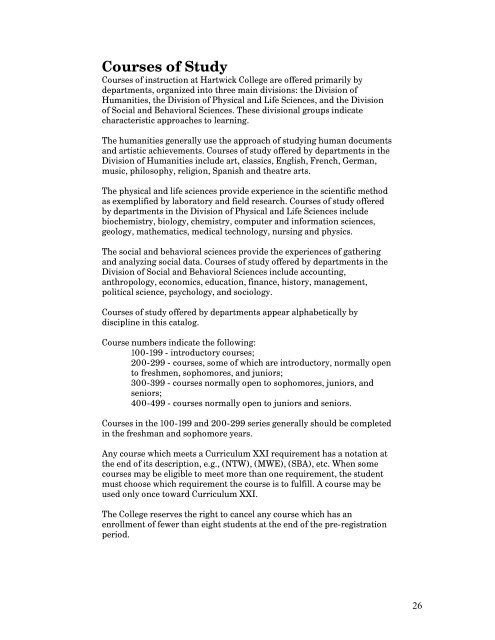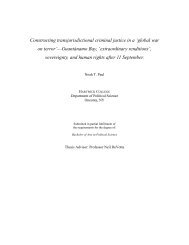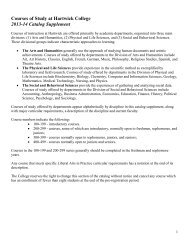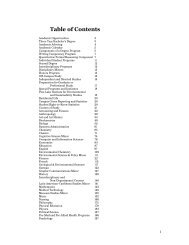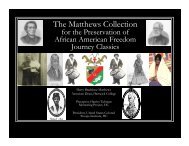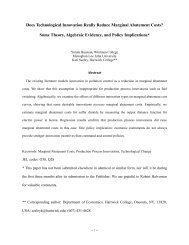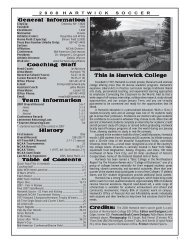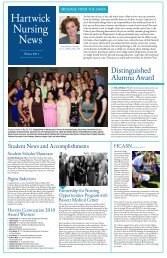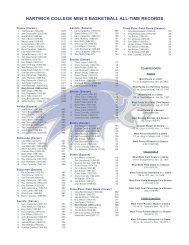- Page 1 and 2: Table of Contents Academic Opportun
- Page 3 and 4: All matters pertaining to major off
- Page 5 and 6: semester hours and physical educati
- Page 7 and 8: Level 2b students passing English 1
- Page 9 and 10: Students in the Environmental Scien
- Page 11 and 12: or coordinator and notify the Regis
- Page 13 and 14: needs. The associate dean and direc
- Page 15 and 16: Independent and Directed Studies Th
- Page 17 and 18: Special Programs and Institutes In
- Page 19 and 20: College Life Residential Life All f
- Page 21 and 22: • SCIENCE AND TECHNOLOGY. The fut
- Page 23 and 24: Curriculum XXI A Flexible Curriculu
- Page 25: General Chemistry A course in biolo
- Page 29 and 30: underlying concepts of accounting a
- Page 31 and 32: environment, ethical disclosure pra
- Page 33 and 34: 490 Senior Thesis Economics Courses
- Page 35 and 36: Anthropology Anthropology is devote
- Page 37 and 38: 250 Topics in Anthropology (credits
- Page 39 and 40: 421 Field Research in Archaeology (
- Page 41 and 42: Art and Art History Producing art a
- Page 43 and 44: Potential studio art majors are req
- Page 45 and 46: will be introduced to concept devel
- Page 47 and 48: 221 Painting: Acrylics (4 credits)
- Page 49 and 50: 303 Italian Renaissance Art History
- Page 51 and 52: Ceramics (270), or Ceramic Workshop
- Page 53 and 54: should arrange to do this internshi
- Page 55 and 56: Requirements for the minor in docum
- Page 57 and 58: and translation of genetic material
- Page 59 and 60: Biology To study biology is to expl
- Page 61 and 62: satisfies one of the requirements i
- Page 63 and 64: of the requirements in the Environm
- Page 65 and 66: interactions, the cell cycle and gr
- Page 67 and 68: Grades for all courses taken in bio
- Page 69 and 70: organizations. Also required are th
- Page 71 and 72: 490 Senior Thesis in Business Admin
- Page 73 and 74: Chemistry majors have a wide range
- Page 75 and 76: or 109; Math 233; Phys 140, 141 or
- Page 77 and 78:
203 Analytical Chemistry 210 Inorga
- Page 79 and 80:
Classics In a future characterized
- Page 81 and 82:
101, 102 Elementary Latin A two-ter
- Page 83 and 84:
language, and self-awareness is the
- Page 85 and 86:
Computer and Information Science An
- Page 87 and 88:
110 Lego Robotics Programming (4 cr
- Page 89 and 90:
structure and architecture. Prerequ
- Page 91 and 92:
233 Multivariable Calculus 235 Adva
- Page 93 and 94:
Economics Hartwick students who cho
- Page 95 and 96:
e carefully scrutinized and empiric
- Page 97 and 98:
109 The Global Environment (Geol) 3
- Page 99 and 100:
Progressive educators who: 4. utili
- Page 101 and 102:
Successful candidates will be recom
- Page 103 and 104:
outline their stances on the contro
- Page 105 and 106:
335 Teaching Middle Childhood and A
- Page 107 and 108:
Teaching Practicum (Fall/Spring Ter
- Page 109 and 110:
writing or an emphasis in writing.
- Page 111 and 112:
200 Business Writing (3 credits) Ex
- Page 113 and 114:
elations to or as independent of tr
- Page 115 and 116:
of novelists such as Defoe, Fieldin
- Page 117 and 118:
Jewett, Twain, James, Dreiser, Norr
- Page 119 and 120:
331 Chaucer 333 Middle English Lite
- Page 121 and 122:
Environmental Chemistry Hartwick Co
- Page 123 and 124:
Environmental Science and Policy Mi
- Page 125 and 126:
French To learn a new language is t
- Page 127 and 128:
Selected Essayists, The Literature
- Page 129 and 130:
French 250 Common Cultural Studies
- Page 131 and 132:
Careers are available in several ar
- Page 133 and 134:
sample petrography. Offered alterna
- Page 135:
German German, Austrian and Swiss c
- Page 138 and 139:
361 Rationalism to Romanticism (3 c
- Page 140 and 141:
Graphic Communications Minor The mi
- Page 142 and 143:
participates in interdisciplinary m
- Page 144 and 145:
adical movements; labor and the lib
- Page 146 and 147:
210 Early Modern Europe (3 credits)
- Page 148 and 149:
of leisure time, race and segregati
- Page 150 and 151:
America and the Caribbean during th
- Page 152 and 153:
complexity, and historical origins/
- Page 154 and 155:
Interdisciplinary and Non- Departme
- Page 156 and 157:
Latin American-Caribbean Studies Mi
- Page 158 and 159:
Mathematics The study of mathematic
- Page 160 and 161:
problems drawn from various discipl
- Page 162 and 163:
differentiation, Riemann integratio
- Page 164 and 165:
Medical Technology Faculty/Coordina
- Page 166 and 167:
Museum Studies Minor Students inter
- Page 168 and 169:
Music Music is a profound and integ
- Page 170 and 171:
Kim Paterson, Rene Prins, Mary-Anne
- Page 172 and 173:
performances (Czech Philharmonic Or
- Page 174 and 175:
364: Music History III: Late Romant
- Page 176 and 177:
majors are required to engage in su
- Page 178 and 179:
Departmental Convocation performanc
- Page 180 and 181:
Recommended Sequence of Courses for
- Page 182 and 183:
Nursing Preparation for a career in
- Page 184 and 185:
C. Health Requirements: Each studen
- Page 186 and 187:
of acute care medical-surgical sett
- Page 188 and 189:
process as it relates to the assess
- Page 190 and 191:
Sequence in the major: Freshman Yea
- Page 192 and 193:
150 Topics in Philosophy (3 credits
- Page 194 and 195:
Two courses in recent philosophy co
- Page 196 and 197:
Rothenberger; Colleen Santos; Ewan
- Page 198 and 199:
national regulations and recommenda
- Page 200 and 201:
Faculty Lawrence Nienart, chair; Ro
- Page 202 and 203:
emphasized in laboratory experiment
- Page 204 and 205:
Political Science The study of poli
- Page 206 and 207:
280 Constitutional Law II: Rights a
- Page 208 and 209:
generally prepared to represent the
- Page 210 and 211:
century. Typically offered alternat
- Page 212 and 213:
Prerequisite depends on the topic.
- Page 214 and 215:
Pre-Med and Pre-Allied Health Progr
- Page 216 and 217:
social relations; cognitive science
- Page 218 and 219:
333 Industrial-Organizational Psych
- Page 220 and 221:
Religious Studies The world’s gre
- Page 222 and 223:
222 Buddhism (3 credits) An explora
- Page 224 and 225:
Sociology Sociologists investigate
- Page 226 and 227:
on public policy regarding children
- Page 228 and 229:
mental illness, crime, healthcare i
- Page 230 and 231:
Bourdieu, Hooks, Freire. Focus is o
- Page 232 and 233:
Spanish The importance of studying
- Page 234 and 235:
4. If you do not successfully pass
- Page 236 and 237:
for the required short essays and p
- Page 238 and 239:
Spanish 302 (2 credits) Senior Thes
- Page 240 and 241:
Recent theatre arts graduates have
- Page 242 and 243:
250 Selected Topics (3 or 4 credits
- Page 244 and 245:
U.S. Ethnic Studies Minor This acad
- Page 246 and 247:
student who elects this option must
- Page 248 and 249:
12 credits selected from the follow
- Page 250 and 251:
honor society. The baccalaureate pr
- Page 252 and 253:
2. Full-time students who wish to c
- Page 254 and 255:
Auditing Courses A student in good
- Page 256 and 257:
the end of Fall and Spring terms (n
- Page 258 and 259:
the minimum full-time course load i
- Page 260 and 261:
Withdrawal from Courses A student w
- Page 262 and 263:
5. A one-month January internship s
- Page 264 and 265:
apply to the Registrar’s Office.
- Page 266 and 267:
opportunity to correct mistakes in
- Page 268 and 269:
Admissions Hartwick seeks to admit
- Page 270 and 271:
It is strongly recommended that stu
- Page 272 and 273:
Summer Accelerated Nursing Program
- Page 274 and 275:
Admissions Application Admissions D
- Page 276 and 277:
Expenses Tuition A full time matric
- Page 278 and 279:
A student not in good financial sta
- Page 280 and 281:
Expenses for Off-Campus Study Off-C
- Page 282 and 283:
Erna McReynolds Oneonta, NY Senior
- Page 284 and 285:
Thomas Beattie, English, professor
- Page 286 and 287:
John K. Clemens, 1980, professor of
- Page 288 and 289:
Mark Kuhlmann, 1997, associate prof
- Page 290 and 291:
Parker Troischt, 2006, Assistant Pr
- Page 292 and 293:
Julie Signitzer, violin, M.M., Bowl
- Page 294:
William Wood, 2004, vice president


